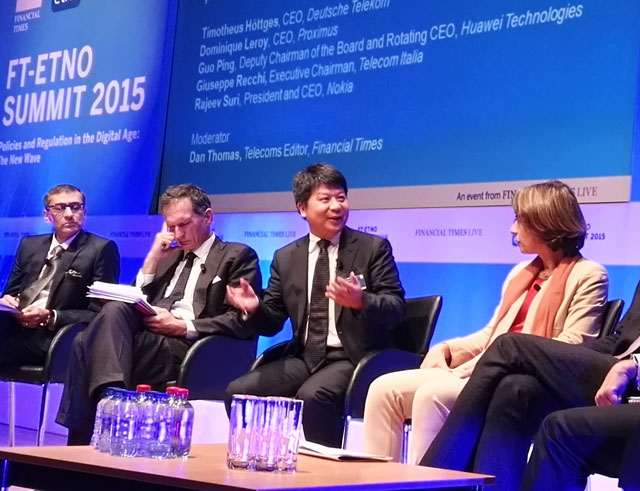“Europe needs to build its tomorrow today” Huawei Rotating CEO Guo Ping at FT-ETNO SUMMIT
[Brussels, Belgium, October 14, 2015]“The strategic focus of the EU's digital economy is to reshape its traditional industries using ICT technologies. This will help Europe maintain its competitive edge,” Guo Ping, Deputy Chairman of the Board and Rotating CEO of Huawei Technologies recently said at the FT-ETNO Summit in Brussels.

Guo Ping (3rd from left), Deputy Chairman of the Board and Rotating CEO of Huawei.
Guo said Europe needs to invest heavily in its digital infrastructure and explore changes to its regulatory policies in order to maintain a competitive edge.
Speaking at a panel discussion entitled “Broadband: The next investment wave and EU policies,” Guo told policymakers and business leaders that, although Europe is well-positioned to transform its traditional industries using digital technologies, regulatory policies may need to shift their focus from competition to development in order to encourage greater investment. Mobile penetration rate in Europe has reached 125%, which means that previous policies of the EU had been very successful. Right now, competition in Europe is stronger than in other regions. Operators do not have a strong desire to make investments because of the uncertainty of getting a fair return on their investment. This is likely to have an effect on Europe in their efforts to lead in the next generation technology implementation across the continent. For example, Shenzhen, a city in China, has more LTE base stations than France does.
Citing Europe's strong capacity in technological innovation, he said the region is likely to lead the global market in 5G. However, he warned that this capacity will develop fully only with the support of the right systems and policies.
Huawei, which helps build infrastructure for many of Europe’s major telecommunications providers, is investing heavily in the European market. The company has helped lay the foundation for future global mobile and wireless communications systems, by taking an active role in both the 5G Infrastructure Public Private Partnership (5G-PPP) and the METIS project.
Huawei plans to invest at least US$ 600 million in 5G research and innovation by 2018. The company now has more than 300 engineers worldwide engaged in 5G research and development, and has set up nine 5G R&D centers globally.

